Aromatherapy and Flowers: How to Use Floral Scents for Relaxation and Stress Relief
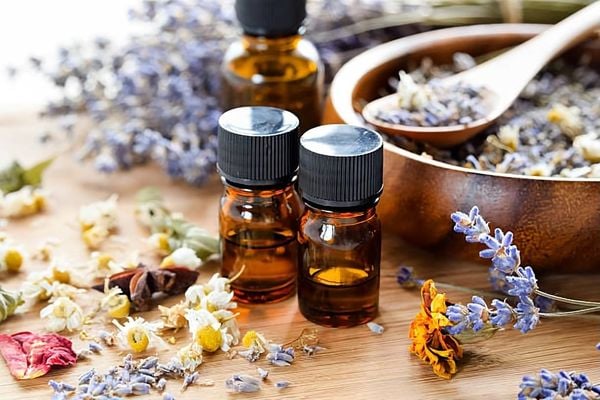
Key Points
- Jasmine is used in perfumes, body sprays, hair care products, and jasmine tea.
- Jasmine promotes healthy hair, reduces stress, and improves mental focus.
- Rose essential oil provides soothing and uplifting effects in aromatherapy.
- Rose is beneficial in skincare for its hydrating, anti-inflammatory, and antioxidant properties.
- Rose is used in cooking for its elegant flavor and is significant in various cultures.
- Chamomile essential oil is widely used in aromatherapy for its calming properties.
- Chamomile offers benefits in skincare due to its soothing and anti-inflammatory nature.
- Chamomile is used in herbal medicine for digestive support, as a sleep aid, and in skincare.
- Chamomile can be incorporated into cooking for its slightly sweet flavor.
- Floral scents can be utilized in daily life for a calming atmosphere, self-care, and sleep improvement.
FAQs
-
Q1: How can jasmine be incorporated into daily life?
A1: Jasmine can be used in perfumes, body sprays, hair care products, and jasmine tea, providing numerous benefits like promoting healthy hair, reducing stress, and improving mental focus.
-
Q2: What are the benefits of rose essential oil in aromatherapy?
A2: Rose essential oil offers soothing and uplifting effects, helps alleviate stress, promotes feelings of love and happiness, and enhances overall well-being.
-
Q3: How is rose utilized in skincare?
A3: Rose is popular in skincare for its hydrating, anti-inflammatory, and antioxidant properties, improving skin tone and texture, and protecting against environmental damage.
-
Q4: How is chamomile used in aromatherapy?
A4: Chamomile essential oil is known for its calming and stress-relieving properties, promoting relaxation, reducing anxiety, and improving sleep quality.
-
Q5: What benefits does chamomile offer in skincare?
A5: Chamomile soothes sensitive or irritated skin, reduces redness, inflammation, and itchiness, and protects the skin from environmental damage to promote a healthy complexion.
-
Q6: How can chamomile be incorporated into cooking?
A6: Chamomile can be used in various culinary applications, including infusing honey, baking, and cocktails, thanks to its mild, slightly sweet flavor.
-
Q7: How can floral scents enhance daily life?
A7: Floral scents can be utilized in daily life for creating a calming atmosphere, incorporating into self-care routines, promoting restful sleep, and personalizing to individual preferences.
-
Q8: Why is it important to consider quality and sustainability in aromatherapy?
A8: It is important to choose products made from natural ingredients without harmful additives, ensuring environmentally-friendly choices to benefit personal well-being and the planet.
-
Q9: How can I create my own aromatherapy garden?
A9: You can plant flowers with calming properties, such as lavender, chamomile, and jasmine, in your garden or on your windowsill for a constant source of soothing scents.
-
Q10: What role do flowers play in reducing stress and anxiety?
A10: By incorporating calming floral scents into your daily routine, you can promote relaxation, reduce stress, and improve your overall well-being.
With the increasing popularity of natural remedies, aromatherapy has become a go-to solution for many individuals seeking solace from the hectic pace of modern life. Aromatherapy and flowers go hand in hand, as the delightful floral scents can evoke feelings of peace, tranquility, and overall well-being. In this article, we'll explore how to use floral scents for relaxation and stress relief, providing you with practical tips and advice on how to incorporate these delightful fragrances into your daily life.
The Power of Aromatherapy
Aromatherapy has a long history, dating back thousands of years, with various cultures utilizing the therapeutic properties of essential oils and plant extracts. The term "aromatherapy" was coined in the early 20th century, and since then, the practice has gained widespread recognition and popularity in the realm of holistic health and wellness. To truly understand the power of aromatherapy, let's delve deeper into its benefits and potential applications.
Benefits of Aromatherapy
- Relaxation and stress relief: As we've already discussed, one of the most well-known benefits of aromatherapy is its ability to promote relaxation and alleviate stress. Different scents can evoke different emotional responses, and many floral scents, in particular, have calming and soothing properties.
- Mood enhancement: Aromatherapy can also have a significant impact on mood. Certain scents can help to lift your spirits, while others may promote feelings of comfort and warmth. For example, citrus scents are known to be energizing and uplifting, whereas earthy scents like sandalwood can evoke a sense of grounding and stability.
- Improved sleep quality: Many people struggle with insomnia or disrupted sleep patterns. Aromatherapy can be a natural and effective way to improve sleep quality by promoting relaxation and reducing stress. Scents like lavender and chamomile are often used to aid in sleep.
- Pain relief: Some essential oils have analgesic properties, meaning they can help to relieve pain. For instance, eucalyptus and peppermint oils are often used to alleviate headaches, while lavender and clary sage can help soothe menstrual cramps.
- Boosting immunity and overall wellness: Certain essential oils are believed to have antibacterial, antiviral, and antifungal properties, which can help support your immune system and overall wellness. Tea tree oil, for example, is known for its antimicrobial properties and is often used to treat various skin conditions.
Applications of Aromatherapy
There are several ways to enjoy the benefits of aromatherapy, depending on your preferences and needs. Some popular methods include:
- Diffusers: Using a diffuser is a simple and effective way to disperse essential oils into the air, allowing you to breathe in their therapeutic properties. Diffusers come in various forms, from ultrasonic to reed diffusers, and can be used with a wide range of essential oils.
- Topical application: Essential oils can be applied directly to the skin when diluted with a carrier oil, such as coconut oil or jojoba oil. This method allows the oils to be absorbed into the bloodstream, providing localized or systemic benefits, depending on the oil being used.
- Inhalation: Inhaling essential oils, either directly from the bottle or by using a personal inhaler, can provide quick relief for certain conditions, such as congestion or headaches.
- Bath and spa treatments: Adding essential oils to bathwater, massage oils, or body scrubs can create a luxurious and therapeutic spa-like experience at home.
- Household cleaning: Many essential oils, such as lemon and tea tree, have antibacterial properties and can be used to create natural cleaning solutions.
As with any holistic practice, it's essential to use high-quality products and consult with a healthcare professional before starting a new treatment, especially if you have any pre-existing health conditions or are pregnant or breastfeeding. When used correctly and safely, aromatherapy can be a powerful tool for enhancing your overall well-being and quality of life.
Floral Scents for Relaxation and Stress Relief
Lavender
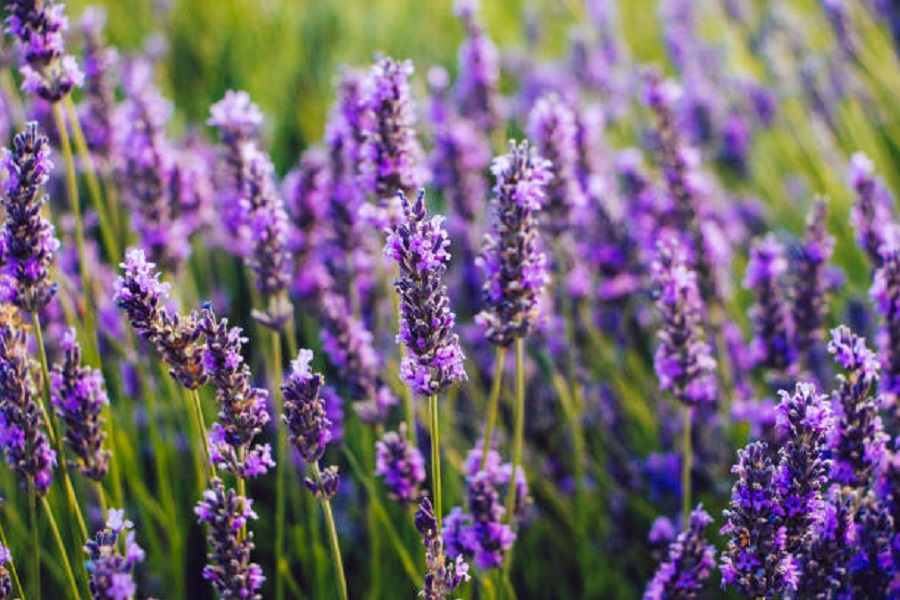
Lavender (Lavandula) is a flowering plant belonging to the mint family, native to the Mediterranean region, Middle East, and India. This popular and versatile herb is known for its distinctive fragrance, beautiful purple flowers, and numerous health and wellness benefits. Here, we'll explore the various uses of lavender, from aromatherapy to culinary applications.
Lavender in Aromatherapy
Lavender, a fragrant and versatile herb, has long been cherished for its calming and soothing properties. With its unmistakable aroma and numerous applications, lavender has become a staple in many households. In this article, we will explore the various uses of lavender in aromatherapy, skincare, and other aspects of daily life.
Lavender in Aromatherapy
Lavender essential oil, derived from the flowers of the lavender plant, is widely used in aromatherapy for its calming and stress-relieving properties. It is known to promote relaxation, reduce anxiety, and improve sleep quality. To experience the benefits of lavender essential oil, you can diffuse it in your home, add a few drops to a warm bath, or incorporate it into massage oils or skincare products.
Lavender in Skincare
Lavender is a popular ingredient in skincare products due to its soothing, anti-inflammatory, and antimicrobial properties. It is especially beneficial for sensitive or irritated skin, as it helps to reduce redness, inflammation, and acne. Additionally, lavender's antioxidant content can protect the skin from environmental damage and promote a healthy complexion. To incorporate lavender into your skincare routine, you can use lavender-infused cleansers, toners, or moisturizers, or even make your own lavender-infused skincare products at home.
Lavender in Daily Life
The calming scent and versatile nature of lavender make it an excellent addition to various aspects of daily life. Here are some ideas for incorporating lavender into your routine:
- Sleep aid: Place a sachet of dried lavender under your pillow or use a lavender-infused pillow spray to promote relaxation and improve sleep quality.
- Insect repellent: Lavender essential oil can be used as a natural insect repellent, helping to ward off mosquitoes, flies, and other pests.
- Laundry: Add a few drops of lavender essential oil to your laundry detergent or dryer sheets for a fresh and calming scent on your clothes and linens.
- Home fragrance: Make a simple lavender room spray or use lavender-scented candles to create a soothing atmosphere in your living space.
Lavender is a versatile and powerful plant, offering numerous benefits in the realms of aromatherapy, skincare, and culinary applications. By incorporating this fragrant herb into your daily routine, you can enjoy the calming and soothing effects it has to offer.
Jasmine
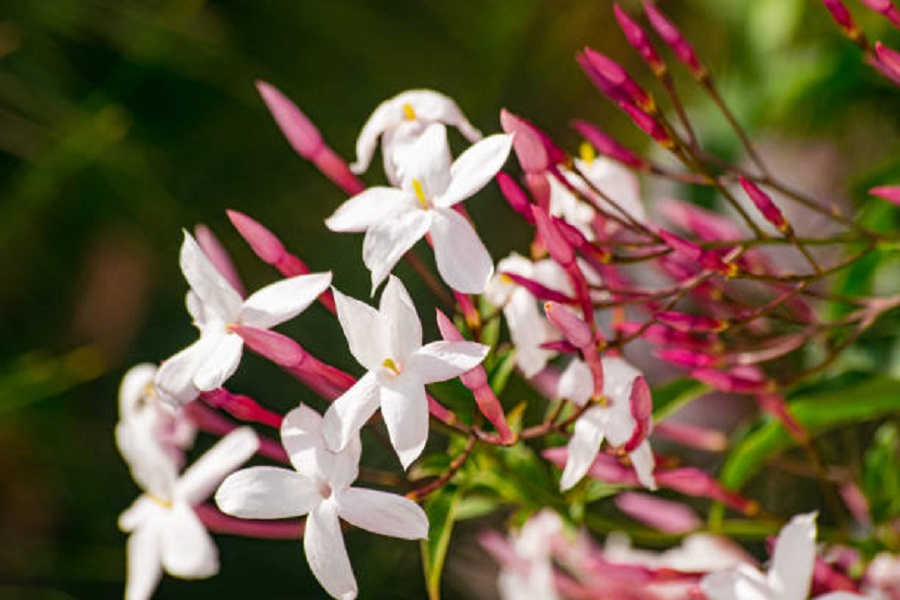
Jasmine (Jasminum) is a flowering plant in the olive family, native to tropical and subtropical regions of Asia, Africa, and the Pacific Islands. With its sweet, intoxicating fragrance and delicate white or yellow flowers, jasmine has long been revered for its aromatic and therapeutic properties. In this article, we'll explore the various uses of jasmine, from its role in aromatherapy to its application in skincare and other products.
Jasmine in Aromatherapy
Jasmine essential oil, derived from the flowers of the jasmine plant, is highly prized in aromatherapy for its mood-enhancing and stress-relieving properties. It is known to promote feelings of happiness, relaxation, and optimism. To experience the benefits of jasmine essential oil, you can diffuse it in your home, add a few drops to a warm bath, or incorporate it into massage oils or skincare products.
Jasmine in Skincare
Jasmine is a popular ingredient in skincare products due to its hydrating, soothing, and antioxidant properties. It is especially beneficial for dry or mature skin, as it helps to improve skin elasticity, reduce the appearance of fine lines, and promote a youthful glow. To incorporate jasmine into your skincare routine, you can use jasmine-infused cleansers, toners, or moisturizers, or even make your own jasmine-infused skincare products at home.
Jasmine in Daily Life
The captivating scent and therapeutic properties of jasmine make it a wonderful addition to various aspects of daily life. Here are some ideas for incorporating jasmine into your routine:
- Perfume: Jasmine's enchanting fragrance makes it a popular choice for natural perfumes and body sprays. You can create your own jasmine-scented perfume by blending jasmine essential oil with a carrier oil, such as jojoba or almond oil.
- Hair care: Jasmine essential oil can be added to your shampoo, conditioner, or hair mask to promote healthy, shiny hair and a soothing scalp treatment.
- Tea: Jasmine tea, made from green tea leaves scented with jasmine flowers, is a delicious and aromatic beverage that can help to reduce stress and improve mental focus.
Rose
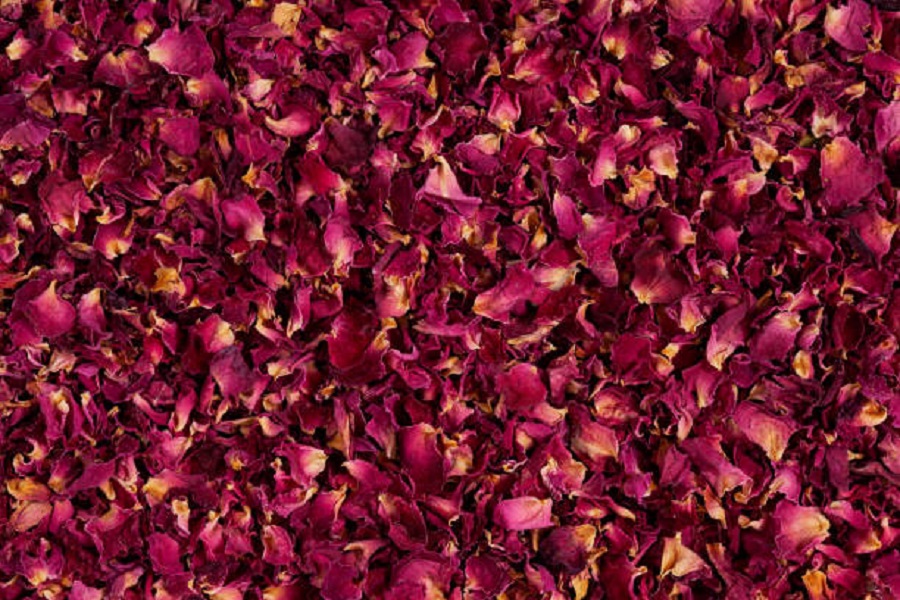
The classic scent of roses is not only romantic but also calming and comforting. In fact, rose essential oil has been found to have a relaxing effect on the nervous system, making it a wonderful addition to your stress relief arsenal. Try incorporating rose-scented products, such as a Pink Rose Basket, into your daily routine to enjoy its soothing aroma.
The rose, a symbol of love and beauty, has been cultivated and cherished for centuries. With its velvety petals and enchanting fragrance, it has captured the hearts and imaginations of people across the globe. In this article, we will delve into the versatile uses of rose, from its role in aromatherapy and skincare to its culinary applications and its significance in various cultures.
Rose in Aromatherapy
Rose essential oil, derived from the petals of the rose plant, is widely used in aromatherapy for its soothing and uplifting properties. Its unmistakable scent is known to alleviate stress, promote feelings of love and happiness, and enhance overall well-being. To experience the benefits of rose essential oil, you can diffuse it in your home, incorporate it into massage oils or skincare products, or simply inhale its aroma directly from the bottle.
Rose in Skincare
Rose is a popular ingredient in skincare due to its hydrating, anti-inflammatory, and antioxidant properties. It is known to soothe sensitive or irritated skin, improve skin tone and texture, and protect against environmental damage. Rosewater, which is a byproduct of the essential oil distillation process, is particularly prized for its gentle and hydrating effects on the skin. To experience the benefits of rose in skincare, you can use rose-infused facial mists, cleansers, toners, or moisturizers, or even make your own rosewater at home.
Rose in Culinary Applications
The delicate and fragrant flavor of rose petals and rosewater can be used in various culinary creations, adding a touch of elegance and romance to your dishes. Some popular ways to incorporate rose in your cooking include infusing rose petals in simple syrup for cocktails and desserts, adding a splash of rosewater to baked goods or beverages, or using dried rose petals as a decorative and edible garnish.
Rose in Culture and Tradition
Throughout history, the rose has held a special place in the hearts and traditions of many cultures. It has been used in religious ceremonies, as a symbol of love and devotion, and as an emblem of beauty and purity. In ancient Greece and Rome, roses were associated with the goddesses of love, Aphrodite and Venus. In Christianity, the rose is often seen as a symbol of the Virgin Mary, representing divine love and purity.
Chamomile
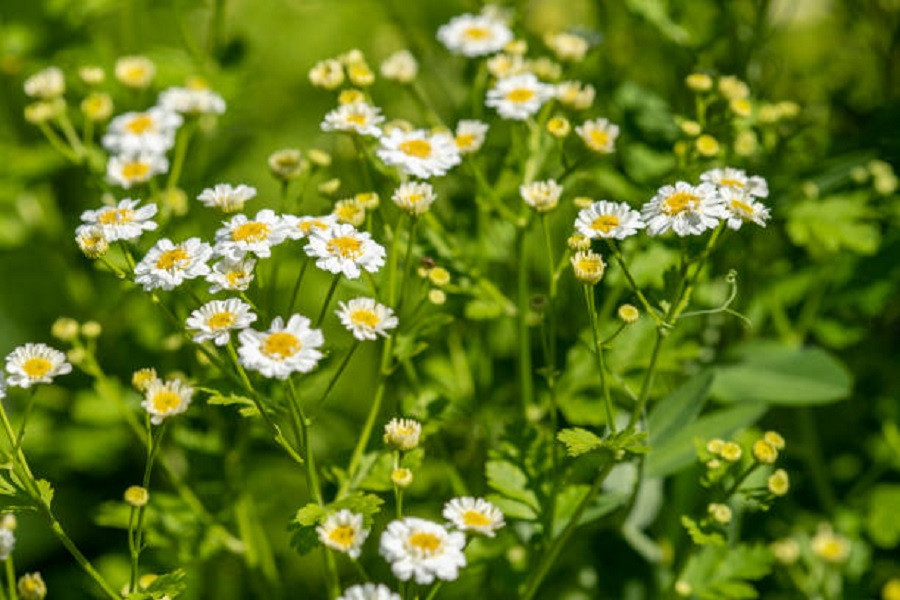
Chamomile, a daisy-like plant with a gentle and calming aroma, has been used for centuries as a natural remedy for a wide range of ailments. Renowned for its soothing and anti-inflammatory properties, chamomile offers numerous benefits that extend beyond its well-known role as a relaxing herbal tea. In this article, we will explore the various uses of chamomile in aromatherapy, skincare, and other applications.
Chamomile in Aromatherapy
Chamomile essential oil, derived from the flowers of the chamomile plant, is widely used in aromatherapy for its calming and stress-relieving properties. It is known to promote relaxation, reduce anxiety, and improve sleep quality. To experience the benefits of chamomile essential oil, you can diffuse it in your home, add a few drops to a warm bath, or incorporate it into massage oils or skincare products.
Chamomile in Skincare
Chamomile is a popular ingredient in skincare products due to its soothing, anti-inflammatory, and antioxidant properties. It is especially beneficial for sensitive or irritated skin, as it helps to reduce redness, inflammation, and itchiness. Additionally, chamomile's antioxidant content can protect the skin from environmental damage and promote a healthy complexion. To incorporate chamomile into your skincare routine, you can use chamomile-infused cleansers, toners, or moisturizers, or even make your own chamomile-infused skincare products at home.
Chamomile in Herbal Medicine
Chamomile has a long history of use in traditional herbal medicine, where it has been used to treat a wide range of ailments, including digestive issues, insomnia, and skin conditions. Some of the most common uses of chamomile in herbal medicine include:
- Digestive support: Chamomile tea is known to soothe an upset stomach, alleviate indigestion, and reduce gas and bloating.
- Sleep aid: Drinking chamomile tea before bedtime can help to promote relaxation and improve sleep quality.
- Skin care: Applying a chamomile-infused compress or ointment to the skin can help to alleviate skin irritations, such as eczema, psoriasis, or minor burns.
Chamomile in Culinary Applications
While chamomile is most often associated with herbal teas, it can also be used in various culinary applications. Its mild, slightly sweet flavor pairs well with both sweet and savory dishes. Some ideas for incorporating chamomile into your cooking include:
- Infusing honey: Simmer dried chamomile flowers with honey to create a fragrant and soothing chamomile-infused honey, which can be used as a sweetener in tea, yogurt, or baked goods.
- Baking: Add dried chamomile flowers to cookie, muffin, or cake recipes for a subtle floral flavor and aroma.
- Cocktails: Experiment with chamomile-infused simple syrup or chamomile tea as a mixer in cocktails for a unique and calming twist.
Practical Tips for Using Floral Scents in Your Daily Life
- Create a relaxing atmosphere: Use floral-scented candles or diffusers in your living spaces to create a calming environment. Products like the Yellow Medley and Garden Basket can provide you with a beautiful and fragrant atmosphere.
- Incorporate scents into your self-care routine: Add floral essential oils to your bath, massage oils, or body lotions for a soothing and stress-relieving experience.
- Use scented products at bedtime: Incorporate calming floral scents, such as lavender or chamomile, into your bedtime routine to promote restful sleep.
- Take a moment to stop and smell the flowers: Literally! Surround yourself with fresh flowers to enjoy their natural aromas. Arrangements like the Divine Orchid can bring both beauty and calming scents to your living space.
- Experiment with combinations: Mix and match different floral scents to create a personalized blend that speaks to your unique preferences and needs. For example, you might combine lavender and rose for a romantic, soothing fragrance.
- Grow your own aromatherapy garden: Plant flowers with calming properties, such as lavender, chamomile, and jasmine, in your garden or on your windowsill. Not only will you enjoy their beautiful blooms, but you'll also have a constant source of soothing scents at your fingertips.
The Importance of Quality and Sustainability in Aromatherapy
When selecting floral products for aromatherapy, it's essential to consider quality and sustainability. Look for products made from natural ingredients, without harmful additives. Our blog on Eco-Friendly Floristry: Sustainable Tips for Green-Thumbed Enthusiasts provides valuable information on how to make environmentally-friendly choices when it comes to your floral purchases.
Summing Up...
In a world where stress and anxiety seem to be ever-present, aromatherapy and flowers can provide a much-needed respite. By incorporating calming floral scents into your daily routine, you can promote relaxation, reduce stress, and improve your overall well-being. Experiment with different scents and methods of use to find the combination that works best for you, and don't forget to consider the quality and sustainability of the products you choose. With a bit of intention and creativity, you can transform your surroundings into a haven of tranquility, using the power of floral aromatherapy to enhance your life in 2023.
Blog Categories
Recent posts
- When You’re in Charlotte and They’re in Boone: An Honest Guide to Watauga Medical Center Flower Delivery
- The Alvin TX Bouquet: Why Lilac Surprise Dominates 1 in 3 Orders
- 3 Must Have Plants For Loved Ones In Danville
- What Are Our Most Searched Flowers State by State
- What Is It About New Yorkers Love Of Flowers?
- 4 Flowers You’ll Want to Grow in Your Small Garden
